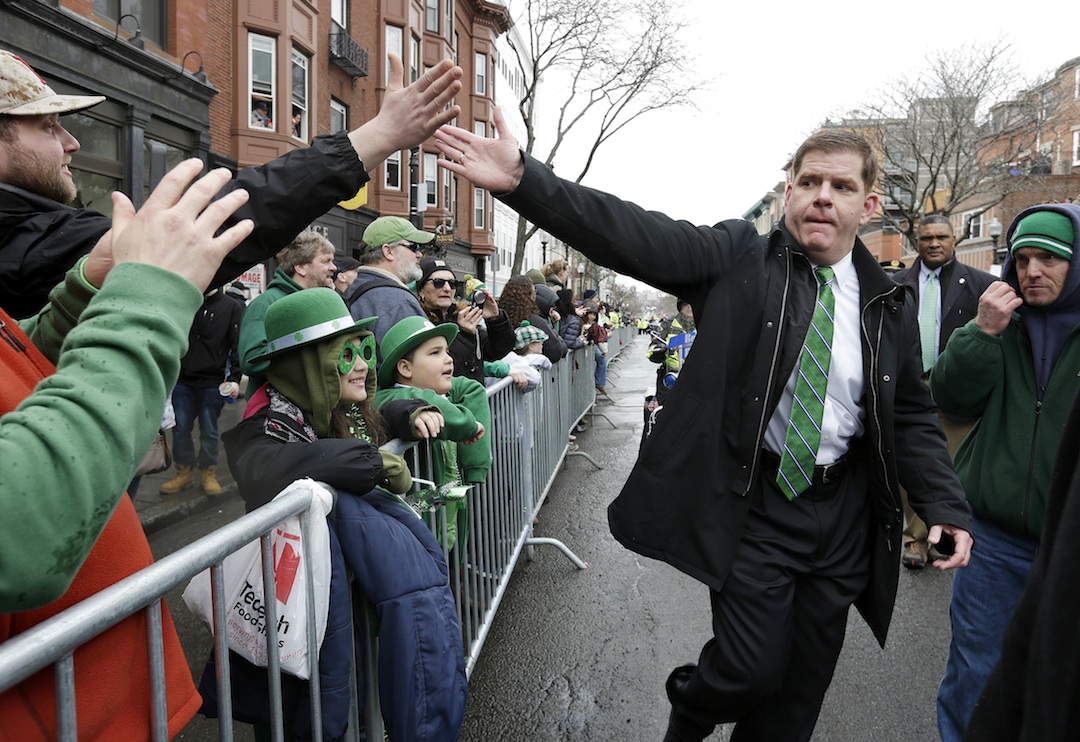Wait, Why Did the Knights of Columbus Skip the St. Patrick’s Day Parade?
In their statement announcing a refusal to participate in this past weekend’s St. Patrick’s Day Parade, The Massachusetts Knights of Columbus produced an absolute masterpiece of meaningless writing. Seriously, it might be the vaguest thing we’ve ever read.
The Catholic fraternal organization skipped the parade, presumably, because its organizers allowed two LGBT-affiliated groups to march. We say “presumably” because at no point in their statement did the Knights of Columbus use the words “gay,” “homosexual,” “LGBT,” “OUTVETS,” or “Boston Pride.” The statement is a tribute to taking approximately 200 words to say exactly nothing.
Let’s take a look. The statement first alludes to the unsavory events of this year’s parade by saying:
We deeply regret that some have decided to use this occasion to further the narrow objectives of certain special interests, which has subjected this occasion to undeserved division and controversy.
The phrase “certain special interests” is as close as this statement comes to identifying LGBT people by name, if indeed that’s the special interest to which they refer. The Knights of Columbus are also angry, by the way, at some other people:
Certain groups have chosen to misrepresent our reason for marching, insisting that we were participating in the parade to support another group or for political reasons. Such allegations are complete fabrications and have no basis in reality whatsoever.
We clear on that? The KOC is angry at certain unidentified people for suggesting that the KOC supports the unidentified agenda of an unidentified special interest group whose interests were being furthered this weekend by an unidentified party. Man, we can really see where they’re coming from, here.
Moving on:
Because the parade has become politicized and divisive, and because of the misrepresentation of our motive for participating, we will not be marching in this year’s parade.
At this point, the Knights of Columbus are really straining. They claim that the parade, whose organizers went all the way to the Supreme Court of the United States in 1995 to preserve their right to exclude gay people, has just now become “politicized.” What they mean is that in a political disagreement that has existed for more than 20 years, their side finally didn’t get its way.
George Orwell once argued that “political language has to consist largely of euphemism, question-begging, and sheer cloudy vagueness” because politicians have to defend decisions like bombing Hiroshima or occupying India, and to do so clearly would require “arguments which are too brutal for most people to face.” Indeed, the Knights of Columbus seem to be using “cloudy vagueness” here because stating their true meaning is uncomfortable. If they were to admit explicitly why they skipped the parade, they would say that they believe homosexuality is a sin, its practitioners are going to hell, and to march in near proximity to a group like Boston Pride might suggest implicit acceptance of that group’s right to identify as homosexual in public.
For an example of clear, direct political speech, look no further than the only other group to publicly withdraw from this year’s parade in protest. The Immaculate Heart of Mary School of Harvard withdrew, its principal Brother Thomas Dalton told the Boston Herald, because “We don’t believe that any Catholic organization should be part of a parade that is promoting a homosexual lifestyle and same-sex marriage and that is their agenda.” In Reuters, he said, “It would appear we were condoning it” if they were to associate with the parade. You might disagree with Brother Dalton, but at least he has the confidence to actually say why his school isn’t marching rather than hide behind snippy vagueries.
The irony of all this is that the Knights of Columbus wrote that they had hoped the parade “would be an occasion for unity and celebration in the city of Boston.” According to most reports, it was. For the first time in decades, Boston’s politicians marched, gay groups were included, and the same crowds that decades earlier had thrown beer cans at LGBT marchers, instead cheered them. The only thing, it seems, that kept the parade from marking a real occasion of unity were the groups that, for fear that the gay agenda might rub off on them, stayed home.



